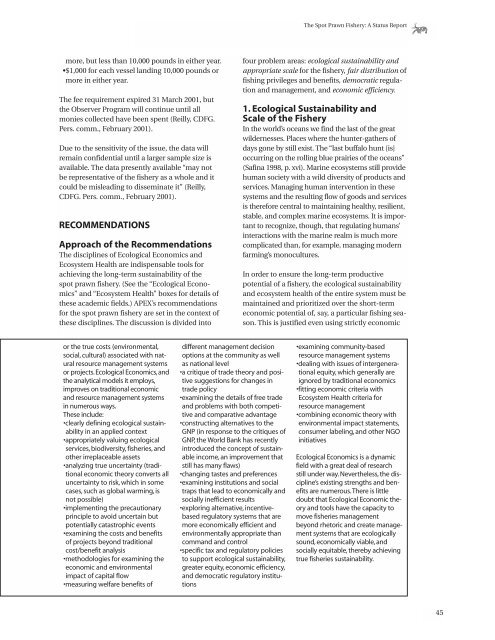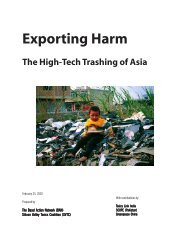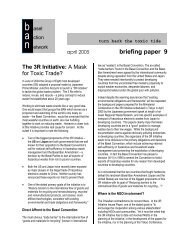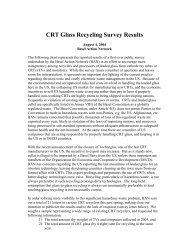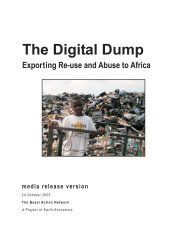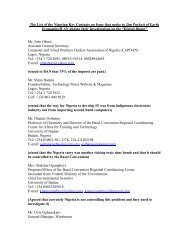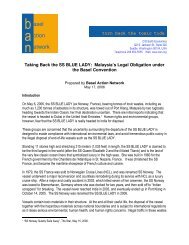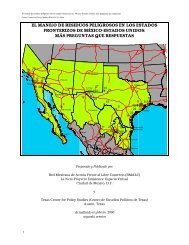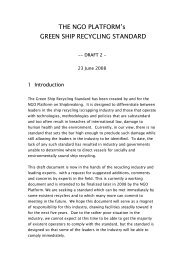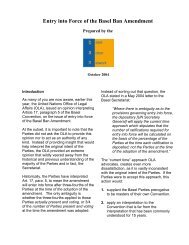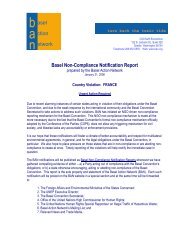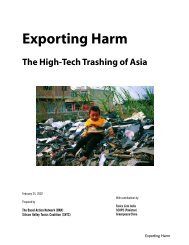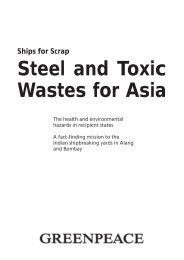The Spot Prawn Fishery The Spot Prawn Fishery - Basel Action ...
The Spot Prawn Fishery The Spot Prawn Fishery - Basel Action ...
The Spot Prawn Fishery The Spot Prawn Fishery - Basel Action ...
Create successful ePaper yourself
Turn your PDF publications into a flip-book with our unique Google optimized e-Paper software.
more, but less than 10,000 pounds in either year.<br />
•$1,000 for each vessel landing 10,000 pounds or<br />
more in either year.<br />
<strong>The</strong> fee requirement expired 31 March 2001, but<br />
the Observer Program will continue until all<br />
monies collected have been spent (Reilly, CDFG.<br />
Pers. comm., February 2001).<br />
Due to the sensitivity of the issue, the data will<br />
remain confidential until a larger sample size is<br />
available. <strong>The</strong> data presently available “may not<br />
be representative of the fishery as a whole and it<br />
could be misleading to disseminate it” (Reilly,<br />
CDFG. Pers. comm., February 2001).<br />
RECOMMENDATIONS<br />
Approach of the Recommendations<br />
<strong>The</strong> disciplines of Ecological Economics and<br />
Ecosystem Health are indispensable tools for<br />
achieving the long-term sustainability of the<br />
spot prawn fishery. (See the “Ecological Economics”<br />
and “Ecosystem Health” boxes for details of<br />
these academic fields.) APEX’s recommendations<br />
for the spot prawn fishery are set in the context of<br />
these disciplines. <strong>The</strong> discussion is divided into<br />
or the true costs (environmental,<br />
social, cultural) associated with natural<br />
resource management systems<br />
or projects. Ecological Economics, and<br />
the analytical models it employs,<br />
improves on traditional economic<br />
and resource management systems<br />
in numerous ways.<br />
<strong>The</strong>se include:<br />
•clearly defining ecological sustainability<br />
in an applied context<br />
•appropriately valuing ecological<br />
services, biodiversity, fisheries, and<br />
other irreplaceable assets<br />
•analyzing true uncertainty (traditional<br />
economic theory converts all<br />
uncertainty to risk, which in some<br />
cases, such as global warming, is<br />
not possible)<br />
•implementing the precautionary<br />
principle to avoid uncertain but<br />
potentially catastrophic events<br />
•examining the costs and benefits<br />
of projects beyond traditional<br />
cost/benefit analysis<br />
•methodologies for examining the<br />
economic and environmental<br />
impact of capital flow<br />
•measuring welfare benefits of<br />
different management decision<br />
options at the community as well<br />
as national level<br />
•a critique of trade theory and positive<br />
suggestions for changes in<br />
trade policy<br />
•examining the details of free trade<br />
and problems with both competitive<br />
and comparative advantage<br />
•constructing alternatives to the<br />
GNP (in response to the critiques of<br />
GNP, the World Bank has recently<br />
introduced the concept of sustainable<br />
income, an improvement that<br />
still has many flaws)<br />
•changing tastes and preferences<br />
•examining institutions and social<br />
traps that lead to economically and<br />
socially inefficient results<br />
•exploring alternative, incentivebased<br />
regulatory systems that are<br />
more economically efficient and<br />
environmentally appropriate than<br />
command and control<br />
•specific tax and regulatory policies<br />
to support ecological sustainability,<br />
greater equity, economic efficiency,<br />
and democratic regulatory institutions<br />
<strong>The</strong> <strong>Spot</strong> <strong>Prawn</strong> <strong>Fishery</strong>: A Status Report<br />
four problem areas: ecological sustainability and<br />
appropriate scale for the fishery, fair distribution of<br />
fishing privileges and benefits, democratic regulation<br />
and management, and economic efficiency.<br />
1. Ecological Sustainability and<br />
Scale of the <strong>Fishery</strong><br />
In the world’s oceans we find the last of the great<br />
wildernesses. Places where the hunter-gathers of<br />
days gone by still exist. <strong>The</strong> “last buffalo hunt [is]<br />
occurring on the rolling blue prairies of the oceans”<br />
(Safina 1998, p. xvi). Marine ecosystems still provide<br />
human society with a wild diversity of products and<br />
services. Managing human intervention in these<br />
systems and the resulting flow of goods and services<br />
is therefore central to maintaining healthy, resilient,<br />
stable, and complex marine ecosystems. It is important<br />
to recognize, though, that regulating humans’<br />
interactions with the marine realm is much more<br />
complicated than, for example, managing modern<br />
farming’s monocultures.<br />
In order to ensure the long-term productive<br />
potential of a fishery, the ecological sustainability<br />
and ecosystem health of the entire system must be<br />
maintained and prioritized over the short-term<br />
economic potential of, say, a particular fishing season.<br />
This is justified even using strictly economic<br />
•examining community-based<br />
resource management systems<br />
•dealing with issues of intergenerational<br />
equity, which generally are<br />
ignored by traditional economics<br />
•fitting economic criteria with<br />
Ecosystem Health criteria for<br />
resource management<br />
•combining economic theory with<br />
environmental impact statements,<br />
consumer labeling, and other NGO<br />
initiatives<br />
Ecological Economics is a dynamic<br />
field with a great deal of research<br />
still under way. Nevertheless, the discipline’s<br />
existing strengths and benefits<br />
are numerous.<strong>The</strong>re is little<br />
doubt that Ecological Economic theory<br />
and tools have the capacity to<br />
move fisheries management<br />
beyond rhetoric and create management<br />
systems that are ecologically<br />
sound, economically viable, and<br />
socially equitable, thereby achieving<br />
true fisheries sustainability.<br />
45


